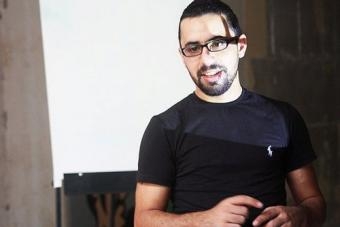
Ali Ghamloush
Ali Ghamloush built an interactive prison into his website, Zinzana (“Prison”), in order to give visitors a feeling for what Lebanese prisons are like. The site also includes a map with information on the country’s prisons, firsthand accounts from tortured detainees, photos and videos, official documents and an explanation of prisoners’ legal rights.
“I want Zinzana to be a social platform for those voiceless prisoners who have been abused and tortured in detention,” Ghamloush said. “There is a serious need to document cases of torture as evidence for human rights violations committed by some investigators.”
Ghamloush was one of six journalists in the training program who each won $3,500 in seed funding for their projects. The trainers judged Ghamloush’s as the best project, and he also won a trip to the United States, where he received further digital journalism training and networking opportunities, including a trip to the South By Southwest digital media conference in Austin, Texas, in March 2012.
The ICFJ program, funded by the U.S. Agency for International Development, began with a distance learning course, “The use of digital tools in public service reporting,” for 60 journalists from all over the Arab world. They learned to use social networks, mobile applications and services, digital maps, online video production and emerging technologies in their reporting.
Participants proposed online multimedia projects they wanted to pursue, and the best 28 were chosen for a boot camp in Cairo, Egypt, in June 2011. During the boot camp, they had intensive, hands-on sessions and one-on-one time with digital journalism experts to move their projects forward. Online mentoring continued when the participants returned home, and they attended a second boot camp in October 2011 to get help finishing their projects.
Ghamloush started using digital tools on his blog, which led to him launch Hibr Newspaper, a online, citizen-journalism news outlet that has trained more than 750 young Lebanese on citizen and digital journalism. Ghamloush trains youth on critical thinking as well. This led him to coordinate an online project, I Love my Vote, which aims to educate Lebanese about the country’s elections and engage them in electoral reform.
In addition to working for Hibr Newspaper, Ghamloush co-founded Alt City, which provides a physical and a virtual space for Lebanese social entrepreneurs to gather. Ghamloush was also active in the recent wave of Arab revolutions. He created a website, “Back to Tahrir” where many Lebanese and Egyptian bloggers and activities worked together to cover the Egyptian revolution.
Ghamloush said he learned a lot in the ICFJ program on using multimedia and mobile tools, designing content, investigative journalism, photography and online platforms development. He applied this knowledge to the way he and his colleagues at Hibr Newspaper cover news.
Now, he wants to share what he learned beyond his immediate colleagues. He is already helping civil society institutions start to use the new techniques.
“I’m compelled to communicate the journalistic skills I learned from ICFJ through nationwide training sessions,” he said.